

Secrets of Easter Island. Welcome to The Ancient Web - The Ancient World's Great Civilizations. Ancient History. History: Ancient History in-depth. Ancient Civilizations. Pre-History. Sumerians. Ottomans. Ancient Forgotten History. Science & Nature - Caveman challenge. History: Ancient History in-depth. Secrets of Easter Island. History - Ancient Worlds. Ancient Civilizations. Herodotus. Place in history[edit] Herodotus announced the size and scope of his work at the beginning of his Researches or Histories: Ἡροδότου Ἁλικαρνησσέος ἱστορίης ἀπόδεξις ἥδε, ὡς μήτε τὰ γενόμενα ἐξ ἀνθρώπων τῷ χρόνῳ ἐξίτηλα γένηται, μήτε ἔργα μεγάλα τε καὶ θωμαστά, τὰ μὲν Ἕλλησι, τὰ δὲ βαρβάροισι ἀποδεχθέντα, ἀκλεᾶ γένηται, τὰ τε ἄλλα καὶ δι' ἣν αἰτίην ἐπολέμησαν ἀλλήλοισι.[2] Herodotus of Halicarnassus, his Researches are here set down to preserve the memory of the past by putting on record the astonishing achievements of both the Greeks and the Barbarians; and more particularly, to show how they came into conflict.[3] His record of the achievements of others was an achievement in itself, though the extent of it has been debated.
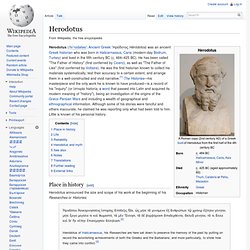
His place in history and his significance may be understood according to the traditions within which he worked. His work is the earliest Greek prose to have survived intact. Homer was another inspirational source.[16] Life[edit] The Old World. Welcome to The Ancient Web - The Ancient World's Great Civilizations. ETUDES ARCHEOLOGIQUES. Archaeologists uncover evidence of large ancient shipyard near Rome University of Southampton Source - CGI of shipyard building - Graphic simulation by Archaeological Computing Research Group, Southampton.
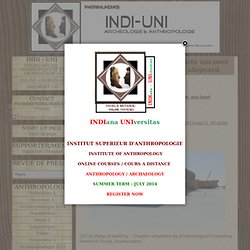
Pre-Civilization. Les Etrusques. History of Man. Sumerians. Ancient Egypt. Pre-Civilization. Ancient Civilizations. Ancient Civilizations. Mesopotamian Astronomy - Babylonian and Persian History. Ever since man first looked up at the stars and asked the question, “Are we Alone?”
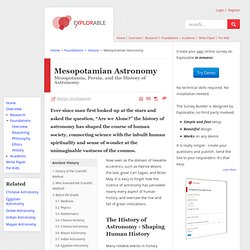
The history of astronomy has shaped the course of human society, connecting science with the inbuilt human spirituality and sense of wonder at the unimaginable vastness of the cosmos. Now seen as the domain of loveable eccentrics, such as Patrick Moore, the late, great Carl Sagan, and Brian May, it is easy to forget how the science of astronomy has pervaded nearly every aspect of human history, and oversaw the rise and fall of great civilizations.
The History of Astronomy - Shaping Human History Many notable events in history were shaped by conjunctions of stars and astronomic events, such as the star (supernova) that guided the Magi to Bethlehem. Halley’s Comet always seems to bring fear, destruction and rebirth in its wake, the portent of doom that caused seismic shifts in human history. Archaeology And Anthropology. Mesopotamian Astronomy - Babylonian and Persian History. History of Man. Mesopotamia & the Ancient Near East. Civilisation mythique. Neanderthal. 'Atlantis' Stone age man. Ebla. Ebla (Arabic: إبلا, modern Tell Mardikh, Idlib Governorate, Syria) was one of the earliest kingdoms in Syria, located about 55 km (34 mi) southwest of Aleppo.

It was an important center throughout the Third millennium BC to the end of the first half of the Second millennium BC Started as a small settlement in the early Bronze Age, it developed into a trading empire and later turned into an expansionist power that imposed its hegemony over much of northern and eastern Syria, its language, the Eblaite language is now considered the earliest attested Semitic language,[1] after Akkadian, the site is most famous for the Ebla tablets, an archive of about 20,000 cuneiform tablets found there,[2] dated from around 2350 BC, written in both Sumerian and Eblaite languages and using the Sumerian Cuneiform which allowed a better understanding of Sumerian. History[edit] The first kingdom[edit] Early period[edit] Archive period[edit] Royal palace G First destruction[edit] Mari revenge: prof.
Palace Q. Mithraism - Dress Rehearsal for Christianity. History of Man. 6 People Who Secretly Ruled The World. Hey, remember that Dick Cheney guy?

You know, the shadowy old man lurking behind George W. Bush and tugging on the strings that jerkily moved Bush's limbs? He still turns up on Fox News sometimes? Mesopotamian Civilizations 6000-550 BC. Cosmopolitan Empires 550 BC- 642 AD. Islamic Empires 600-1900 AD. Pre 10500 b.C. Lost Civilization. History of Mesopotamia. Ancient Near East. Sumerians 3500-2340 BC. Akkadians 2340-1900 BC. Canaanites 2000-1480 BC. Babylonians 1900-1100 BC. Hammurabi. Hittites 1700-1500 BC. Hurrians 1500-1270 BC. Assyrians 1200-1100 BC. Mesopotamia. Clues to Lost Prehistoric Code Discovered in Mesopotamia. Researchers studying clay balls from Mesopotamia have discovered clues to a lost code that was used for record-keeping about 200 years before writing was invented.
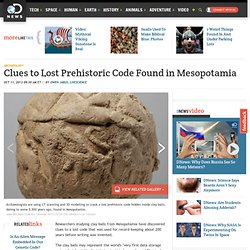
The clay balls may represent the world's "very first data storage system," at least the first that scientists know of, said Christopher Woods, a professor at the University of Chicago's Oriental Institute, in a lecture at Toronto's Royal Ontario Museum, where he presented initial findings. The balls, often called "envelopes" by researchers, were sealed and contain tokens in a variety of geometric shapes — the balls varying from golf ball-size to baseball-size.
Only about 150 intact examples survive worldwide today. [See Photos of the Clay Balls & Lost Code] PHOTOS: Cryptic Codes Yet to Be Cracked The researchers used high-resolution CT scans and 3D modeling to look inside more than 20 examples that were excavated at the site of Choga Mish, in western Iran, in the late 1960s. PHOTOS: Ancient Etruscan Prince Emerges From Tomb. Historic People. Ancient Civilizations.
Mesopotamia & the Ancient Near East. Military history. Military history is a humanities discipline within the scope of general historical recording of armed conflict in the history of humanity, and its impact on the societies, their cultures, economies and changing intra and international relationships.

Professional historians normally focus on military affairs that had a major impact on the societies involved as well as the aftermath of conflicts, while amateur historians and hobbyists often take a larger interest in the details of battles, equipment and uniforms in use. The essential subjects of military history study are the causes of war, the social and cultural foundations, military doctrine on each side, the logistics, leadership, technology, strategy, and tactics used, and how these changed over time. Whereas Just War Theory explores the moral dimensions of warfare, and to better limit the destructive reality caused by war, seeks to establish a doctrine of military ethics. Historiography of military history[edit] Early historians[edit]
Ancient warfare. 'Atlantis' Greek/Roman Mythology. Neanderthal. Princess Mononoke (1997) Ancient History. Let Me Explain to You a Thing. Let Me Explain to You a Thing. Free Downloads Clairvision School. Ancient-Wisdom Site Map. The Academy for Ancient Texts. Ancient texts library (Complete) Bored? You can easily help scholars decode ancient Egyptian writings, only a minute fraction of which have been studied because of the sheer volume of them. After only a short tutorial you can do something truly important for science. : InternetIsBeautifu.
The 10 Most Not-So-Puzzling Ancient Artifacts: The Ica Stones. As we move on down the line of the 10 most not-so-puzzling ancient artifacts, we come to the Ica Stones.
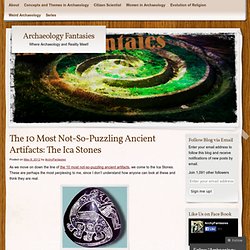
These are perhaps the most perplexing to me, since I don’t understand how anyone can look at these and think they are real. A bad day for Fred Flintstone These little gems range in size from cobbles to boulders, and depict a wide variety of images from humans co-existing with dinosaurs, to advanced surgery, and spaceships with advanced technology. Apparently, this one is a modern hoax starting in 1966 when one, Dr. Javier Cabrera Darquea, a Peruvian physician, received a small carved rock as a gift for his birthday. The Fish That Started it All. Never mind that Dr. Dr. Dr. Ten Archaeological Enigmas from Across the Globe. One of the best things about archaeology is uncovering places, artifacts, and human remains that answer long-held mysteries about our past and our origins.
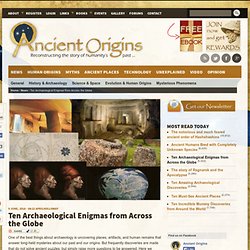
But frequently discoveries are made that do not solve ancient puzzles, but simply raise more questions to be answered. Here we feature ten such discoveries – from indecipherable manuscripts to Frankenstein mummies, and incredible artifacts from unknown civilizations. Jurassic Systems. Civilizations. Chinese Antiques - The Curator's Eye. Ancient History Encyclopedia. Archeologie. Archéologie - Histoire - L'archéologie est aujourd'hui une science reconnue avec ses professionnels, ses techniques, ses méthodes et ces bénévoles qui, dans un strict respect du site et de ce qu'il contient, mettent à jour une part de notre passé.
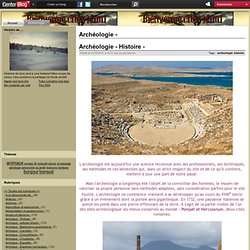
Mais l'archéologie a longtemps été l'objet de la convoitise des hommes, le moyen de valoriser sa propre personne sans méthodes adaptées, sans considération parfois pour le site fouillé. L'archéologie ne commence vraiment à se développer qu'au cours du XVIIIe siècle grâce à un événement dont la portée sera gigantesque. En 1732, une paysanne italienne se prend les pieds dans une pierre effleurant de la terre. Il s'agit de la partie visible de l'un des sites archéologique les mieux conservés au monde : Pompéï et Herculanum, deux cités romaines. Pompéï Herculanum Au cours du XIXe siècle, les choses évoluent guère plus dans un premier temps pour adopter à la fin du siècle des techniques plus scientifiques et des études plus sérieuses. Olympie Delphes. FEATURED NEW ACQUISITIONS - Masterworks of Ancient Art. FIRST CIVILIZATIONS: MESOPOTAMIA AND EGYPT. The Iberians and the Celts were the most important peoples that inhabited the Iberian Peninsula in Antiquity.
The Iberians The Iberians settled on the Mediterranean coast between the 6th century BC and the arrival of the Romans in the 1st century BC. The social organisation was tribal. Tribes were usually governed by a king or regulus. Goddesses, whores, wives, and slaves: women in classical antiquity. History: Ancient History in-depth. History - Ancient History in depth: Voices from Ancient Egypt Gallery. History: Egyptians. Ostia - Topographical dictionary. Buildings The excavators have divided Ostia into five regions, numbered I to V. Photo Gallery. PREHISTORY. When men and women started to live in villages, there was a specialization of work. Some people cultivated fields, other people looked after the animals and others made weapons, fabrics, and other objects. There were two important technical innovations in the Neolithic Age: fabrics and pottery. They produced fabrics from animals’ wool using tools like bone spindles, and rudimentary looms.
Pottery was made by hand and baked in a bonfire. New objects were invented such as vessels to hold the grain, bowls for eating and cooking, etc. Neolithic means New Stone. Semitic. Map showing the distribution of Semitic languages In linguistics and ethnology, Semitic (from the Biblical "Shem", Hebrew: שם, translated as "name") was first used to refer to a language family of West Asian origin, now called the Semitic languages.
This family includes the ancient and modern forms of Ahlamu, Akkadian (Assyrian-Babylonian), Amharic, Ammonite, Amorite, Arabic, Aramaic/Syriac, Canaanite/Phoenician/Carthaginian, Chaldean, Eblaite, Edomite, Ge'ez, Hebrew, Maltese, Mandaic, Moabite, Sutean, Tigre and Tigrinya, and Ugaritic, among others. Origin. Stone age man. The Greek Temple. The River Valley Civilizations. Une civilisation disparue il y a 12 000 ans découverte à Gobekli Tepe, site préhistorique turc.